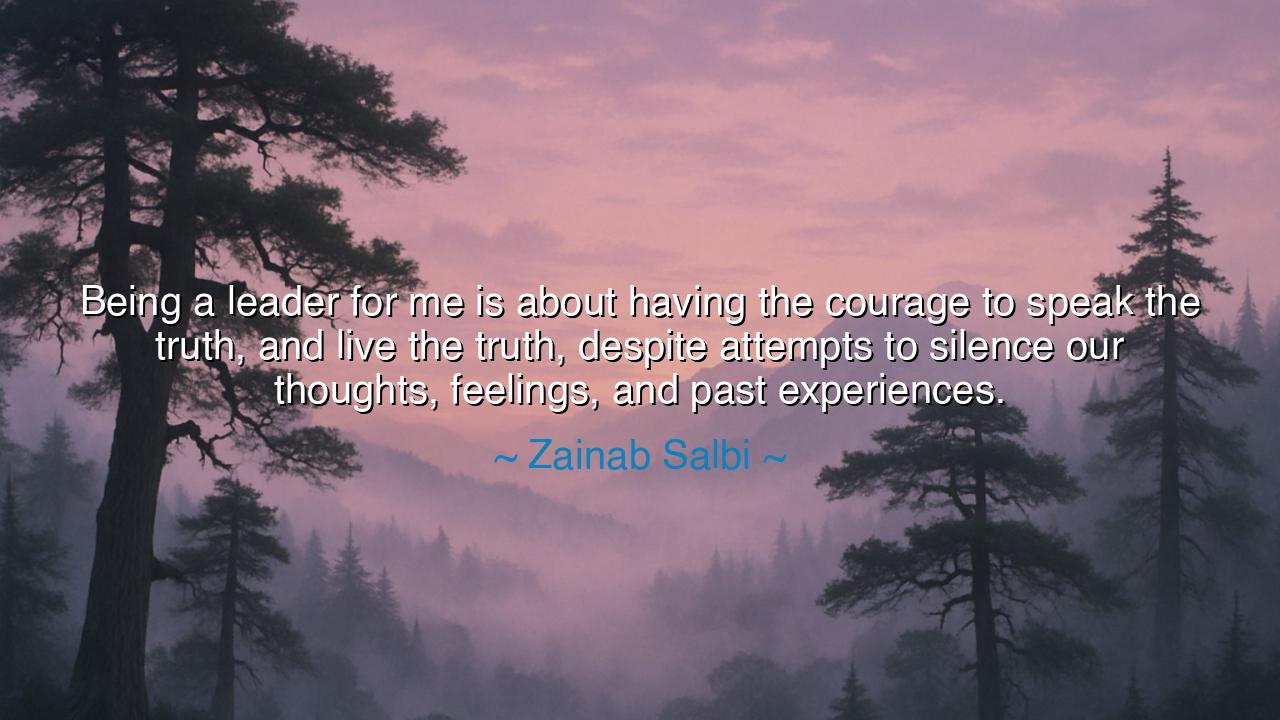
Being a leader for me is about having the courage to speak the
Being a leader for me is about having the courage to speak the truth, and live the truth, despite attempts to silence our thoughts, feelings, and past experiences.






“Being a leader for me is about having the courage to speak the truth, and live the truth, despite attempts to silence our thoughts, feelings, and past experiences.” — Thus spoke Zainab Salbi, a woman of fierce compassion and indomitable strength, who rose from the shadows of war to become a voice for peace and justice. In these words, she reveals a truth older than empires: that leadership is not about power or position, but about courage — the sacred bravery to speak and live truth when falsehood reigns, when silence is safer, when the world demands that we forget who we are.
Zainab Salbi’s life is the soil from which this wisdom grows. Born in Iraq under the regime of Saddam Hussein, she saw from a young age the cost of fear and the corruption of truth. Later, as a refugee and activist, she founded Women for Women International, an organization that rebuilt the lives of women survivors of war. Through her work, she came to understand that true leadership does not come from commanding others, but from embodying integrity — from daring to tell one’s story, to bear witness to suffering, and to refuse the silence that tyranny demands. Her quote is not an idea spoken from comfort, but a truth earned through pain and perseverance.
When she speaks of the courage to speak and live the truth, she touches the very essence of the human spirit. The ancients taught that truth (aletheia, in Greek) means “unconcealment” — the lifting of the veil that hides reality. To live truthfully, therefore, is to live unveiled, exposed, vulnerable, yet radiant with authenticity. But the world, in every age, has feared such light. Institutions of power — political, cultural, or even personal — thrive on silence, on conformity, on forgetting. Thus, to speak truth is to rebel against the forces that profit from deceit. It is not an act of arrogance but of love — love for justice, for memory, for the dignity of one’s own soul.
History offers countless examples of those who lived this teaching. Consider Nelson Mandela, who spent twenty-seven years in prison for daring to speak a truth his oppressors could not bear to hear: that all men are born equal, and no chain can bind the human spirit. They tried to silence him with walls and bars, but he carried truth within him like fire. When he emerged, he did not speak vengeance but reconciliation — and in doing so, he became not just a political leader, but a moral one. His life, like Salbi’s words, teaches that leadership born of truth transforms not only nations but the human heart itself.
To speak the truth is only half the battle; to live the truth is the harder path. Many speak courageously yet live timidly. True leadership demands that one’s actions mirror one’s convictions, that one’s life be an open declaration of what one believes. Salbi reminds us that even in our private lives, we are called to this alignment — to refuse the hypocrisy that numbs the soul. The world is filled with noise, but the rarest sound is the harmony between word and deed. Such harmony gives rise to integrity, and integrity is the foundation of all lasting leadership.
The attempts to silence us that Salbi speaks of are not always external. Often, the greatest silencing comes from within — from our own fear of rejection, our own wounds, our own disbelief in our worth. Many are taught to bury their feelings and experiences, to hide their pain so as not to disturb the peace. Yet Salbi, who listened to the stories of women whose voices had been stolen by war, knew that healing begins when the truth is spoken aloud. Each person’s story is a thread in the fabric of humanity; to silence one is to weaken the whole. Thus, to live truthfully is also to give others permission to do the same — to be mirrors of courage for one another.
The lesson, then, is timeless: if you would lead, first be truthful — with yourself, with others, and with the world. Speak even when your voice shakes; live even when fear whispers “stay quiet.” Let your truth be not a weapon, but a lantern — something that illuminates rather than wounds. Leadership, as Salbi teaches, is not the roar of dominance, but the steady flame of integrity that refuses to be extinguished. The greatest leaders are those who dare to stand in their truth, unflinching, and in doing so, awaken courage in those around them.
So remember, my child: every generation faces the choice between comfort and truth, between silence and courage. The path of truth is lonely, but it is also luminous. Do not fear being misunderstood or labeled; fear only the death of your own authenticity. When you walk with truth, even the forces that seek to silence you become your teachers. For as Zainab Salbi teaches, to speak and live the truth is not merely an act of leadership — it is the act of liberation itself, the victory of the soul over all that would keep it bound.






AAdministratorAdministrator
Welcome, honored guests. Please leave a comment, we will respond soon